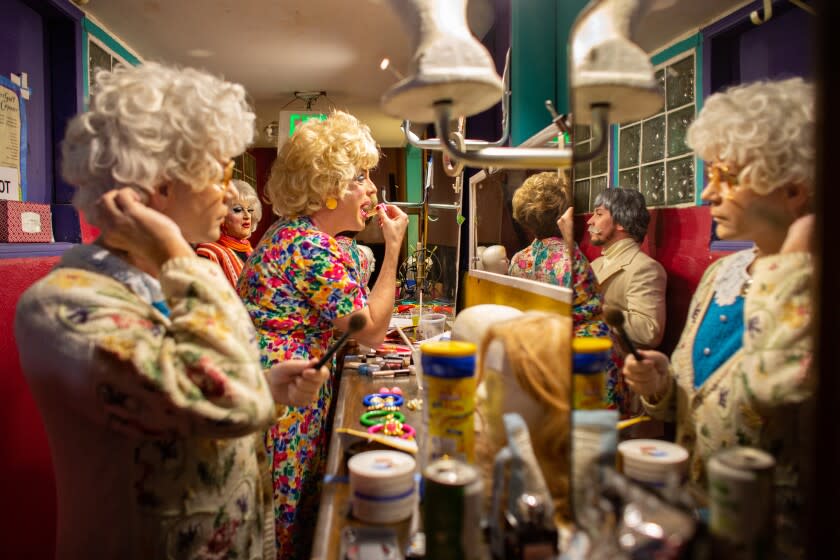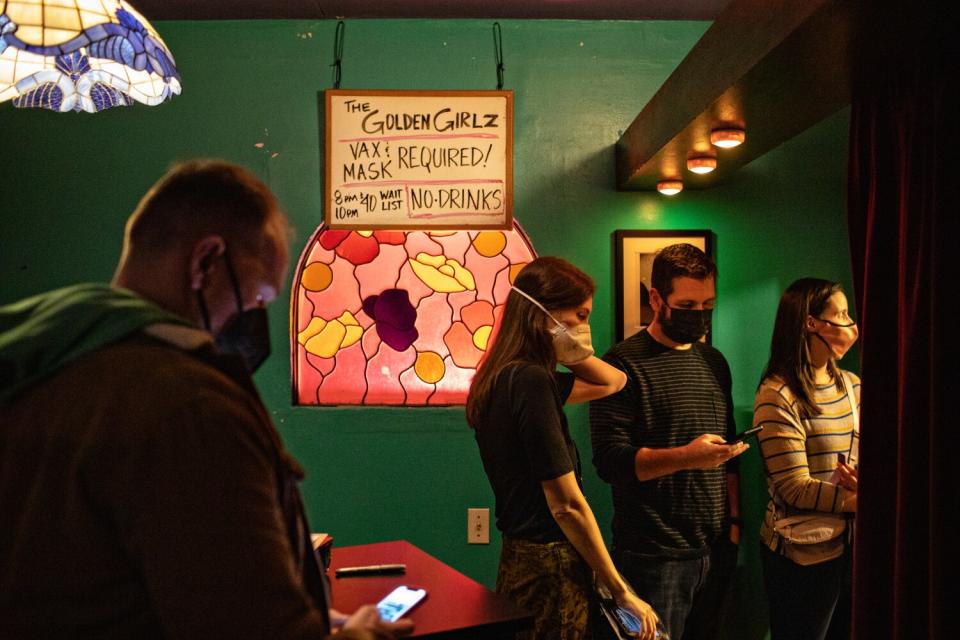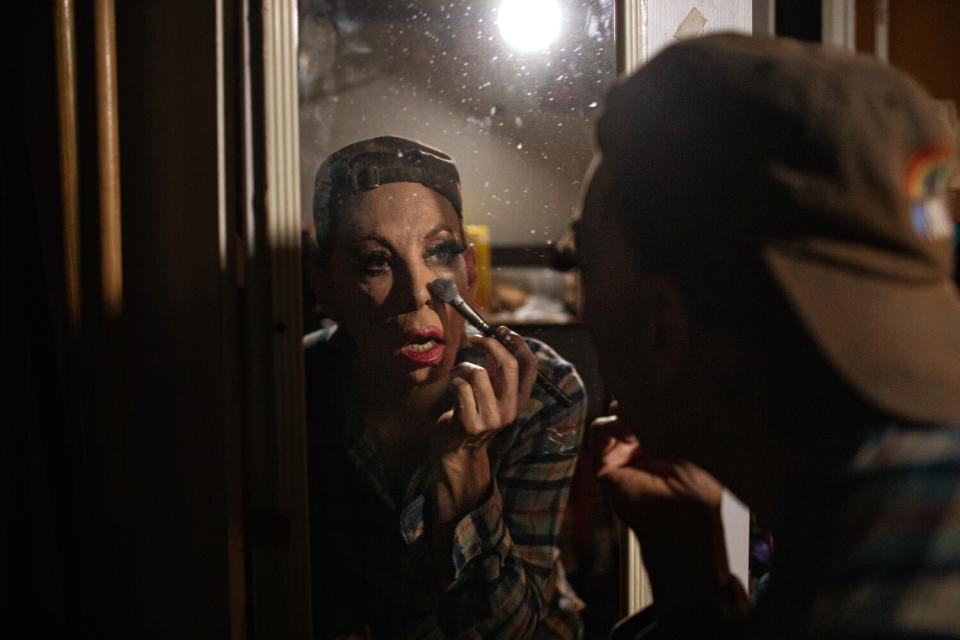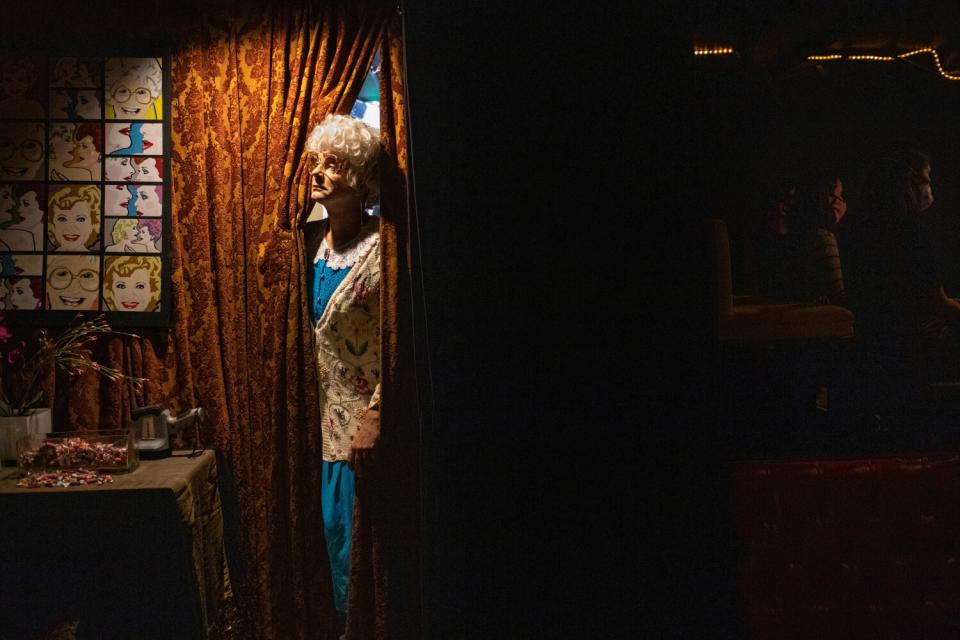The drag queens of 'Golden Girlz Live' celebrate Betty White and a lifetime of queer friendship

- Oops!Something went wrong.Please try again later.
- Oops!Something went wrong.Please try again later.
- Oops!Something went wrong.Please try again later.
Picture it: Silver Lake, 2022. A line of people in N95s and Orville Peck-inspired fringe masks carefully descend a staircase into a basement beneath a hot pink restaurant, greeted by lesbian fan fiction "Golden Girls" art as everyone is escorted to their seats. “Thank You for Being a Friend” plays, and the crowd goes crazy. The stage lights go up with Sherry Vine, Jackie Beat, Sam Pancake and Drew Droege huddled around a kitchen table holding their places with gestures of exaggerated anticipation in full "Golden Girls" drag, making it feel as if somehow we’ve all skipped dimensions and are the live studio audience in an alternative reality version of "The Golden Girls" directed by John Waters.
"Golden Girlz Live" is more than just a drag show tribute to "The Golden Girls." It was born out of a love for the show and its impact on the queer community, as well as a passion for anti-commercial, queer underground theater and performance art. For drag queen Sherry Vine, “'The Golden Girls' will always be [her] Shakespeare.”
Vine and friends and collaborators Beat, Pancake and Droege have been getting together at the Cavern Club — the basement theater of Mexican restaurant Casita Del Campo — since 2014, performing interpretations of classic "Golden Girls" content. This week they return with a brand-new, sold-out show called "Cheesecake and Crème," with special guest star BenDeLaCrème of RuPaul’s "Drag Race" fame, coinciding with what would have been Betty White’s 100th birthday.
It’s no secret that "Golden Girls" has achieved icon status with queer viewers. Talk to most groups of gay friends and it's almost certain that there are self-proclaimed Dorothys, Roses, Sophias and Blanches in each group dynamic. From 1985 to 1990, "The Golden Girls" was the tent pole in NBC’s lineup, sitting at the much-heralded 9 p.m. Saturday slot for five out of the seven seasons of its prime-time run, which ended in 1992. People planned their weekend schedules around it, and gay clubs in Los Angeles and around the country would even turn the music down so patrons could watch while still enjoying a night out on the town.


While there is much to unpack regarding contemporary understandings of representation and tropes, especially concerning characters of color, the show has maintained its popularity not just because of queer characters, storylines and writers on the show but because of the ability of queer people to read themselves into characters who were quick-witted and hilarious, raunchy and bitchy, underpinned by a critical optimism during difficult and lonely times. What resonates with queer audiences is a story about the power of friendship and chosen family exemplified through four powerhouse actresses pushing back against both ageism and the patriarchy on a mainstream network at the height of the Reagan era.
"Golden Girlz Live" may be influenced and rooted in the mainstream series but is truly an underground endeavor rooted in subversive and celebratory practices of queer fandom and performance. Vine and Beat — whose friendship is as much a part of their legacy as Theater Couture, zines, Wigstock and the drag shows that made them the legends they are today — started out doing a mix of performance art, theater and club drag in New York and Los Angeles in the 1990s.
“When Jackie and I first met we not only didn’t fit in but we were ostracized,” Vine says, explaining how most assimilationist-oriented gay bars in West Hollywood not only didn’t get their drag but used “no open toe shoe” policies in the 1990s as a way to refuse to let drag queens and trans women in unless it was a specified night.
The duo turned its attention away from WeHo and spent time in alternative clubs like Highways, LATC, Cinematic and Club F—, where Vine remembers that “one night you’d have Ron Athey setting his nipples on fire then the next night you’d have drag.” These kinds of spaces and creative communities gave life to Vine and Beat. “When we were coming up it was people like Vaginal Davis and Divine, people turning the tables on what people understood as normative ideas of what glamour is,” Beat says. “As far as drag is concerned, everybody wants to be pretty! Who's gonna want to play four old ladies?”
Pancake and Droege are not drag queens but experienced TV actors who became fast friends after meeting at a party in Melissa McCarthy’s backyard in 2004. Pancake did his share of what he describes as “here’s your salad, ladies” stereotypical gay roles that existed for out actors in the ‘90s, but cut his teeth doing theater, performance art and sketch comedy.
“We’re all show ponies and vaudevillians,” says Droege, who got his start in the Groundlings, talking about how the members of "Golden Girlz Live" gravitated toward each other. “We’re weirdos and gay nerds and all laugh at the same things.” They all share a love of underground theater, performance art, dark comedy, John Waters, classic Hollywood and of course, "The Golden Girls." BenDeLaCrème is thrilled to be a visiting member of the cast after being a fan of everyone’s work, citing watching the 1995 movie "Wigstock" in the early 2000s as a central moment in their queer awakening, expanding what they considered could be possible as a drag performer.

While Beat and Vine are purists, Droege and Pancake do an interpretation that can be thought of as "The Golden Girls" on acid. Vine emphasizes the multiple syllables (and shoulder wiggles) of Blanche’s Southern drawl, Pancake fully leans into Sophia’s dry butch gravel and wit. Beat uses Dorothy’s aggressive eyebrows like weapons, Droege plays Rose’s trademark naivety like a master instrumentalist. And of course the glitter, rattan and tacky print-induced late-‘80s Miami retiree aesthetic that "The Golden Girls" have become synonymous with are center stage too. For this run of "Golden Girlz Live," BenDeLaCrème brings their trademark manic chipperness with a dark undertone as well as a Charles-Bush-meets-Sunset-Blvd. energy to their interpretations of a child star, a nurse and a housewife.
“It's fun to get to play these different types of archetypes,” BenDeLaCrème says, noting that there has become a certain kind of normative glamour expectation for queens known for their work on "RuPaul’s Drag Race." "This is a really great way to stretch outside of what I normally get to do.”
Tight-knit friendship and chosen family are at the core of "Golden Girlz Live," and this is reflected in its dedicated audience who come to revel in the hilarity of classic sitcom writing through drag interpretations.
People came from as far as Seattle and Norway for opening night Jan. 14, and with the difficult loss-filled years that so many have collectively endured, it felt as if the need for laughter through the comfort and queer camaraderie of "The Golden Girls" was more needed than ever.
“I knew the first show back [after Covid-19 closures] had to be 'Golden Girlz,’" says Mr. Dan, a longtime show organizer at the Cavern Club and on-site production assistant to the crew. “At the time it was subversive as hell,” he says, reckoning with the gravity of the connection between queerness and death for television representation of gay characters during his youth. “When I was a kid if there was a gay character on a show they had to die by suicide or murder. And then during the ‘80s if there was a gay character they had to die of AIDS.”
Though lots of people died on "The Golden Girls," it was not the queer characters, and the main characters' ability to bring humor and light to dark situations as well as about being near the end of life was powerful. For Mr. Dan, "The Golden Girls'" ability to be a source of comfort and laughter for queer people during the HIV/AIDS crisis of the '80s is an essential reason the show has become a part of the queer canon.
Casita Del Campo is an important and under-sung location on the map of Los Angeles queer history. Opened by Rudy Del Campo, a dancer who made a name for himself as one of the Sharks in the original "West Side Story," the restaurant became a hot spot for queer people in the '60s, complete with velvet-curtained booths for privacy and security, not just for LGBTQ patrons but also for people who wanted to smoke weed in public such as jazz musicians who would famously come for a drink after finishing gigs at other clubs around town.


“The Cavern Club Celebrity Theater,” as Mr. Dan calls it, with an emphasis on "celebrity," was dug out in order to make space for live events that included drag shows from the beginning, and was named to honor the multitude of celebrities who have visited over the years, from Rock Hudson to Liza Minnelli to Katy Perry. Because of its history, its vibe and its intimacy, “there’s nowhere else like it,” Pancake says. “We can look the crowd right in the eye and they can see us and we can see them and that kind of connection is why people come to Casita. It's extremely special and unlike any other theaters in L.A. or New York.”
Which can be for better or for worse, like the time a drunken member of the crowd kept finishing Droege’s lines, getting increasingly louder for the entire show while telling him, "I love you!" It was when he stepped on Droege’s last line that the performer had no other choice but to break the fourth wall. “I couldn't help it. I just said, 'would you please shut the f— up?'” From what the queens have heard, Betty White probably would have said that too.
Pancake and Droege had the opportunity to work on a set with White. “She was lovely, warm and kind,” Pancake remembers, “always happy to pose for a picture and seemed to have a generous spirit. She didn’t have to work that past 20 years!” All of the Girlz have immense respect for her work on "The Golden Girls," as well as on "Mary Tyler Moore" and her 1953 sitcom "Life With Elizabeth." “The genius of Betty White is that she’s so honest and she’s so real," says Droege. “We should all strive to live that long and have the world cry when we leave the planet.”
Beat used to walk out onto stages and open with a joke that brought a roller coaster of emotion to audiences. “I know we’re here to have a good time, but I made the mistake of going online just before I came out here, I saw the news about Betty White. I just want to dedicate this show to her because she was our last living Golden Girl … I’m kidding, she’s fine!” Beat won’t be opening shows like that anymore.
“If there’s anything we’ve learned these past few years, it's that nothing takes the place of sitting in the dark with strangers and loved ones and watching a live performance,” says Beat. “'The Golden Girls' can say horrible things to each other! That’s how a queen of my generation expresses affection. If I didn’t really love you I wouldn’t go through the trouble of making a mean joke!”


This story originally appeared in Los Angeles Times.

